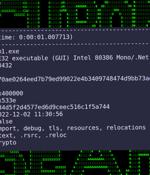Security News

Porsche cut its minting of a new NFT collection short after a dismal turnout and backlash from the crypto community, allowing threat actors to fill the void by creating phishing sites that steal digital assets from cryptocurrency wallets. To make matters worse, a flourishing NFT resale market was set up over at OpenSea, where it was cheaper to buy the Porsche collectibles than get the original, which devalued the assets immediately and further infuriated investors and traders.

This is a good list of modern phishing techniques.

Bitwarden and other password managers are being targeted in Google ads phishing campaigns to steal users' password vault credentials. Unless you use a local password manager, like KeePass, most password managers are cloud-based, allowing users to access their passwords through websites and mobile apps.

An unusual phishing technique has been observed in the wild, hiding empty SVG files inside HTML attachments pretending to be DocuSign documents. Security researchers at email security provider Avanan named it "Blank Image." They explain that the attack allows phishing actors to evade detection of redirect URLs.

GPT-3 language models are being abused to do much more than write college essays, according to WithSecure researchers. Perhaps unsurprisingly, GPT-3 proved to be helpful at crafting a convincing email thread to use in a phishing campaign and social media posts, complete with hashtags, to harass a made-up CEO of a robotics company.

The notorious information-stealer known as Vidar is continuing to leverage popular social media services such as TikTok, Telegram, Steam, and Mastodon as an intermediate command-and-control server. What's new in the latest version of the malware is that the gathered data is encoded prior to exfiltration, a change from the previous variants that have been known to send the compressed file data in plaintext format.

A new phishing campaign is exploiting the increasing interest of security community members towards Flipper Zero to steal their personal information and cryptocurrency. [...]

Threat actors behind a recent malware campaign have been using the stolen information of bank customers in Colombia as lures in phishing emails designed to infect targets with the BitRAT remote access trojan, according to cloud security firm Qualys. The company found that the infrastructure of an undisclosed Colombian cooperative bank had been hijacked by attackers while investigating BitRAT lures in active phishing attacks.

A new targeted phishing campaign has zoomed in on a two-factor authentication solution called Kavach that's used by Indian government officials. LNK files are used to initiate code execution which eventually downloads and runs a malicious C# payload, which functions as a remote access trojan," Securonix researchers Den Iuzvyk, Tim Peck, and Oleg Kolesnikov said in a new report.

The FBI warns that threat actors are using search engine advertisements to promote websites distributing ransomware or stealing login credentials for financial institutions and crypto exchanges. These ads appear at the top of search result pages and link to sites that look identical to the impersonated company's website.